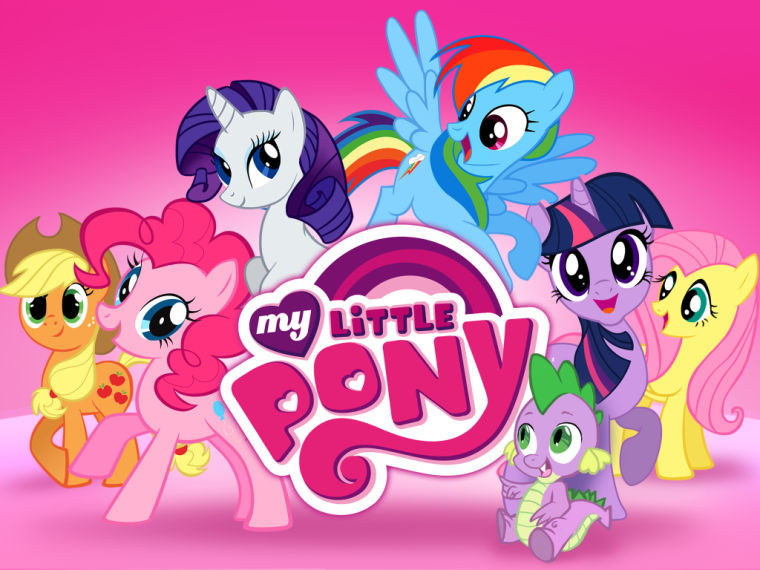
Shelters from an online culture dominated by negativity and hate, Internet communities based around a love of the endlessly positive kids show My Little Pony have attracted thousands — and spread into the real world.
EDITOR’S NOTE: A student’s name has been withheld to protect his privacy.
It was the last Friday in April at about 9 p.m., and the Student Involvement Suite in Stamp Student Union reeked of french fries.
A group of students were sprawled out on ottomans and couches , talking and laughing. A few held bags of fast food. One had a guitar. A stuffed pony was perched on one of the ottomans — a centerpiece of sorts — representing the element that had brought the group together.
My Little Pony, originally a series of toys and later a number of television shows designed for girls, has grown into a phenomenon for thousands across the country. The franchise’s 2010 resurgence in My Little Pony: Friendship is Magic, thanks to Lauren Faust (also known for work on Foster’s Home for Imaginary Friends and The Powerpuff Girls), has taken on a cult following, the majority of which is men ages 18-30. They follow the show’s messages and nuances like a religion, mostly through a growing Internet fan base.
They call themselves “bronies.”
Bronies are, first and foremost, an Internet sensation; their home base is EquestriaDaily.com, equivalent to the Reddit of My Little Pony, complete with fan art, song remixes and fan fictions. They come together in meet-ups across the country to put faces with names. There are two in the Washington area — one downtown and one in College Park.
Ken Passwaters — the one with the guitar — began to nonchalantly strum the theme song to My Little Pony as the rest of the room chatted, swapping jokes from the show. Passwaters, a sophomore geology major, started out as many bronies do — apprehensively watching the first episode of the fourth generation — and, reeled in by a cliffhanger, ended up staying.
“I just kept on watching, and eventually my own self-hatred went away,” he said.
* * *
In the first few episodes, several factors initially hook the bronies to the show. The voice talent on My Little Pony is superior, they say. Tara Strong is the voice of main pony, Twilight Sparkle, and she has a lengthy resume bronies like to cite — she voiced Dil Pickles on Rugrats, Bubbles on The Powerpuff Girls and Timmy Turner on The Fairly OddParents, among other characters. The show’s art is beautiful, they say, and the writing is quick and witty.
They then bond together through episodes uploaded to YouTube, memes, graphics and songs, providing a language and a glue for a community united around a television show. It’s like any fan club, but with accentuating factors that make it unique.
E., a senior geographical sciences major, wished to be identified by just his first initial for this story. He said brony culture distinguishes itself by the show’s themes of friendship and loyalty, which the fandom unites around.
“I can’t honestly say that there will ever be a more accepting, loving community of any fandom out there, ever,” he said.
E. is a self-described closeted brony — not always willing to make his viewing habits widely known — but he spoke candidly at Stamp in April. He’s passionate about his relatively new love for the elements of a TV show.
The date Oct. 24, 2012, is etched in his memory as the most special of his anniversaries — it’s the day he became a brony. Before discovering My Little Pony, E. was a self-described disloyal friend, someone who valued personal needs over the needs of others.
Now, he’s Skyped with friends who’ve needed him until about 5 a.m.
“Being a brony for seven months, I can safely say that I’ve got a much more positive outlook on life overall,” he said. “I feel like I’ve become a better friend and a better person overall.”
He said the show has been documented as a “prescription for depression,” which extends to the online fan base, as well. He said he’s met more lifelong friends in the time he’s been a brony than in the two decades before that.
“Come for the show, stay for the community,” E. said.
It has, however, turned away some people who see the oddities of grown men watching a children’s television show. There have been online outcries that those who watch My Little Pony are homosexual or perverted. Some online forums, too, include claims that bronies aren’t being harassed and should stop behaving as if they are because Internet users don’t care about a person’s favorite television show.
The show and community disregard gender norms, E. said.
“The most important thing I’ve learned from being in this fandom is that men are allowed to cry,” he said.
“People feel safe and comfortable talking about things that you might not even admit to your parents,” he added.
His parents don’t know he’s a brony.
* * *
From a young age — because of the fate of chromosome arrangements and random luck — boys and girls are culturally conditioned to a few operatives.
Boys like dirt, blood, cars, trucks, video games, war, destruction, obstruction, explosions and anything that makes loud or obnoxious noises.
Girls like hair, makeup, pink, purple, nail polish, glitter, sparkles, fashion, lip gloss, Barbie dolls, small animals, teen magazines.
And ponies. Especially ponies. Girls love ponies. Boys — even when they ride small members of the genus equus — never ride ponies, never anything with the cutesy “–y” ending; they ride horses.
* * *
Jason Lenkowsky became a brony in summer 2011.
“Bronies share a common bond,” he said. “We all tend to share the same personality type.”
Bronies tend to be the geeky ones who cling to computers and love Internet memes and online connections, he said.
Lenkowsky is a senior electrical engineering major, right in the middle of the 18- to 30-year-old age bracket. He said being a brony is similar to being part of Greek life or another organization with like-minded people.
Unlike some of his fellow bronies, Lenkowsky isn’t shy about his love for the show. He sat in Stamp, wearing a black My Little Pony T-shirt that read “Every Day I’m Shufflin’” — based on episode content and the LMFAO song — under a red jacket.
He’s been to BronyCon, the convention for fans of the show. In 2012, he said, the crowd was capped at 4,000 because of space constraints.
The show is in no way just for young girls, he said, nor is it just for young people. He said it must have been designed knowing that parents would be watching the show alongside their kids. Lenkowsky cited Walt Disney’s quote about marketing — creators are dead if they only market for kids because adults are just kids grown-up.
* * *
About half an hour later, the Wii was in place, hooked up to the television inside one of the activity rooms in the suite. The bronies dragged chairs around it. YouTube would be their entertainment source for the night. Their first clip was a parody video entitled “Friendship is Magic Bitch.” It involved ponies getting catapulted to the moon by the show’s most powerful character and incorporated meme humor, rage faces and heavy trolling.
The bronies in the room voiced the words along with the video, cracking up, uniting together over something they’d previously witnessed on separate screens.
The meet-up had only just begun.



